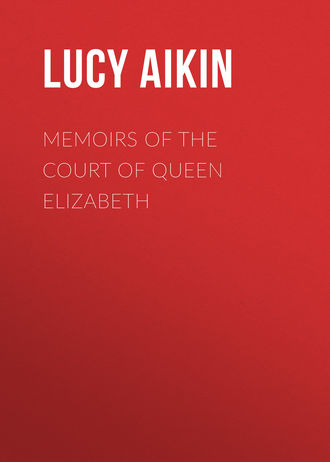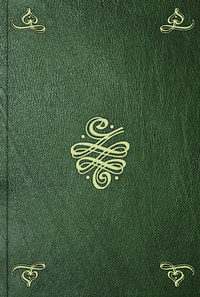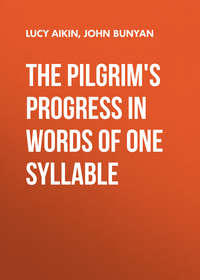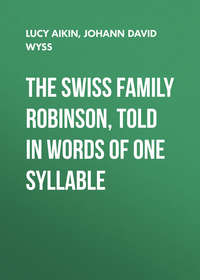 полная версия
полная версияMemoirs of the Court of Queen Elizabeth
He went to Walsingham, told him that the warrant was signed for executing the sentence against the queen of Scots; agreed with him at the same time about the letter to be written to sir Amias for her private assassination;—then got the warrant sealed, then dispatched the letter.
The next morning, the queen sent him word to forbear going to the chancellor till she had spoken with him again. He went directly to acquaint her that he had already seen him. She asked, "what needed such haste?" He pleaded her commands, and the danger of delay. The queen particularized some other form in which she thought it would be safer and better for her to have the thing done. Davison answered, that the just and honorable way would, he thought, be the safest and the best, if she meant to have it done at all. The queen made no reply, but went to dinner.—It appears from another statement of Davison's case, also drawn up by himself, that it was on this very day, without waiting either for Paulet's answer or for more explicit orders from her majesty, that he had the incredible rashness to deliver up the warrant to Burleigh, and to concur in the subsequent proceedings of the council; though aware that the members were utterly ignorant of the queen's application to Paulet.
A day or two after, her majesty called him to her in the privy chamber, and told him smiling, that she had been troubled with him in a dream which she had had the night before, that the queen of Scots was put to death; and which so disturbed her, that she thought she could have run him through with a sword. He answered at first jestingly, but, on recollection, asked her with great earnestness, whether she did not intend that the matter should go forward? She answered vehemently and with an oath, that she did; but again harped upon the old string;—that this mode would cast all the blame upon herself, and a better might be contrived. The same afternoon she inquired if he had received an answer from sir Amias; which at the time he had not, but he brought it to her the next morning. It contained an absolute refusal to be concerned in any action inconsistent with justice and honor. At this the queen was much offended; she complained of what she called the "dainty perjury" of him and others, who contrary to their oath of association cast the burthen upon herself. Soon after, she again blamed "the niceness of these precise fellows;" but said she would have the thing done without them, and mentioned one Wingfield who would undertake it. Davison remonstrated against this design; and also represented the dangerous dilemma in which Paulet and Drury would have been placed by complying with her wishes; since, if she avowed their act, she took it upon herself, "with her infinite dishonor;" if she disavowed it, they were ruined. It is absolutely inconceivable how a man who understood so well the perils which these persons had skilfully avoided, should have remained so blind to those which menaced himself; yet Davison, by his own account, still suffered the queen to go on devising new schemes for the taking off of Mary, without either acquainting her that the privy-council had already sent off Beal with the warrant, or interfering with them to procure, if possible, the recall of this messenger of death. Even on his next interview with her, which he believes to have been on Tuesday, the very day before the execution of the sentence, when her majesty, after speaking of the daily peril in which she lived, swore a great oath, that it was a shame for them all that the thing was not yet done, and spoke to him to write a letter to Paulet for the dispatch of the business; he contented himself with observing generally, that the warrant was, he thought, sufficient; and though the queen still inclined to think the letter requisite, he left her without even dropping a hint that it was scarcely within the limits of possibility that it should arrive before the sentence had been put in execution.
Of this unaccountable imprudence the utmost advantage was taken against him by his cruel and crafty mistress; whose chief concern it had all along been to discover by what artifice she might throw the greatest possible portion of the blame from herself upon others. Davison underwent a long imprisonment; the fine, though it reduced him to beggary, was rigorously exacted; some scanty supplies for the relief of his immediate necessities, while in prison, were all that her majesty would vouchsafe him; and neither the zealous attestations of Burleigh in the beginning to his merit and abilities and the importance of his public services, nor the subsequent earnest pleadings of her own beloved Essex for his restoration, could ever prevail with Elizabeth to lay aside the appearances of perpetual resentment which she thought good to preserve against him. She would neither reinstate him in office nor ever more admit him to her presence; unable perhaps to bear the pain of beholding a countenance which carried with it an everlasting reproach to her conscience.
From the formidable responsibilities of this unprecedented action, the wary Walsingham had withdrawn himself by favor of an opportune fit of sickness, which disabled him from taking part in any thing but the application to sir Amias Paulet, by which he could incur, as he well knew, no hazard. A still more crafty politician, Leicester, after throwing out in the privy-council hints of her majesty's wishes, which served to accelerate the decisive steps there taken, had artfully contrived to escape from all further participation in their proceedings. Both ministers, in secret letters to Scotland, washed their hands of the blood of Mary. But Leicester, not content with these defensive measures, sought to improve the opportunity to the destruction of a rival whom he had never ceased to hate and envy. To his insidious arts the temporary disgrace of Burleigh is probably to be imputed; and it seems to have been from the apprehension of his malignant misconstructions that the lord treasurer refused to put on paper the particulars of his defence, and never ceased to implore admission to plead his cause before his sovereign in person. His perseverance at length prevailed: the queen saw him; heard his justification, and restored him to her wonted grace; after which the tacit compromise between the minister and the favorite was restored;—that compromise by which, during eight-and-twenty years, each had vindicated to himself an equality of political power, personal influence, and royal favor, with the secret enemy whom he vainly wished, or hoped, or plotted, to displace.
To relate again those melancholy details of Mary's closing scene, on which the historians of England and of Scotland, as well as the numerous biographers of this ill-fated princess, have exhausted all the arts of eloquence, would be equally needless and presumptuous. It is, however, important to remark, that she died rather with the triumphant air of a martyr to her religion, the character which she falsely assumed, than with the meekness of a victim or the penitence of a culprit. She bade Melvil tell her son that she had done nothing injurious to his rights or honor; though she was actually in treaty to disinherit him, and had also consented to a nefarious plot for carrying him off prisoner to Rome; and she denied with obstinacy to the last the charge of conspiring the death of Elizabeth, though by her will, written the day before her death, she rewarded as faithful servants the two secretaries who had borne this testimony against her. A spirit of self-justification so haughty and so unprincipled, a perseverance in deliberate falsehood so resolute and so shameless, ought under no circumstances and in no personage, not even in a captive beauty and an injured queen, to be confounded, by any writer studious of the moral tendencies of history and capable of sound discrimination, with genuine religion, true fortitude, or the dignity which renders misfortune respectable.
Let due censure be passed on the infringement of morality committed by Elizabeth, in detaining as a captive that rival kinswoman, and pretender to her crown, whom the dread of still more formidable dangers had compelled to seek refuge in her dominions: let it be admitted, that the exercise of criminal jurisdiction over a person thus lawlessly detained in a foreign country was another sacrifice of the just to the expedient, which none but a profligate politician will venture to defend; and let the efforts of Mary to procure her own liberty, though with the destruction of her enemy and at the cost of a civil war to England, be held, if religion will permit, justifiable or venial;—but let not our resentment of the wrongs, or compassion for the long misfortunes, of this unhappy woman betray us into a blind concurrence in eulogiums lavished, by prejudice or weakness, on a character blemished by many foibles, stained by some enormous crimes, and never under the guidance of the genuine principles of moral rectitude.
CHAPTER XXI
1587 AND 1588Small political effect of the death of Mary.—Warlike preparations of Spain destroyed by Drake.—Case of lord Beauchamp.—Death and character of the duchess of Somerset.—Hatton appointed chancellor.—Leicester returns to Holland—is again recalled.—Disgrace of lord Buckhurst.—Rupture with Spain.—Preparations against the Armada.—Notices of the earls of Cumberland and Northumberland—T. and R. Cecil—earl of Oxford—sir C. Blount—W. Raleigh—lord Howard of Effingham—Hawkins—Frobisher—Drake.—Leicester appointed general.—Queen at Tilbury.—Defeat of the Armada.—Introduction of newspapers.—Death of Leicester.
It is well deserving of remark, that the strongest and most extraordinary act of the whole administration of Elizabeth,—that which brought the blood of a sister-queen upon her head and indelible reproach upon her memory,—appears to have been productive of scarcely any assignable political effect. It changed her relations with no foreign power, it altered very little the state of parties at home, it recommended no new adviser to her favor, it occasioned the displacement of Davison alone.
She may appear, it is true, to have obtained by this stroke an immunity from that long series of dark conspiracies by which, during so many years, she had been disquieted and endangered. To deliver the queen of Scots was an object for which many men had been willing to risk their lives; but none were found desperate or chivalrous enough to run the same hazard in order to avenge her. But the recent detection of Babington and his associates, and the rigorous justice executed upon them, was likely, even without the death of Mary, to have deterred from the speedy repetition of similar practices; and a crisis was now approaching fitted to suspend the machinations of faction, to check the operation even of religious bigotry, and to unite all hearts in the love, all hands in the protection, of their native soil.
Philip of Spain, though he purposely avoided as yet a declaration of war, was known to be intently occupied upon the means of taking signal vengeance on the queen of England for all the acts of hostility on her part of which he thought himself entitled to complain.
Already in the summer of 1587 the ports of Spain and Portugal had begun to be thronged with vessels of various sorts and every size, destined to compose that terrible armada from which nothing less than the complete subjugation of England was anticipated;—already had the pope showered down his benedictions on the holy enterprise; and, by a bull declaring the throne of the schismatic princess forfeited to the first occupant, made way for the pretensions of Philip, who claimed it as the true heir of the house of Lancaster.
But Elizabeth was not of a temper so timid or so supine as to suffer these preparations to advance without interruption. She ordered Drake to sail immediately for the coast of Spain, and put in practice against her enemy every possible mode of injury and annoyance. To the four great ships which she allotted to him for this service, the English merchants, instigated by the hopes of plunder, cheerfully added twenty-six more of different sizes; and with this force the daring leader steered for the port of Cadiz, where a richly-laden fleet lay ready to sail for Lisbon, the final rendezvous for the whole armada. By the impetuosity of his attack, he compelled six galleys which defended the mouth of the harbour to seek shelter under its batteries; and having thus forced an entrance, he took, burned and destroyed about a hundred store-ships and two galleons of superior size. This done, he returned to Cape St. Vincent; then took three castles; and destroying as he proceeded every thing that came in his way, even to the fishing-boats and nets, he endeavoured to provoke the Spanish admiral to come out and give him battle off the mouth of the Tagus. But the marquis of Santa Croce deemed it prudent to suffer him to pillage the coast without molestation. Having fully effected this object, he made sail for the Azores, where the capture of a bulky carrack returning from India amply indemnified the merchants for all the expenses of the expedition, and enriched the admiral and his crews. Drake returned to England in a kind of triumph, boasting that he had "singed the whiskers" of the king of Spain: nor was his vaunt unfounded; the destruction of the store-ships, and the havoc committed by him on the magazines of every kind, was a mischief so great, and for the present so irreparable, that it crippled the whole design, and compelled Philip to defer, for no less than a year, the sailing of his invincible armada.
The respite thus procured was diligently improved by Elizabeth for the completion of her plans of defence against the hour of trial, which she still anticipated.—The interval seems to afford a fit occasion for the relation of some incidents of a more private nature, but interesting as illustrative of the manners and practices of the age.
It has been already mentioned, that the secret marriage of the earl of Hertford with lady Catherine Gray, notwithstanding the sentence of nullity which the queen had caused to be so precipitately pronounced and the punishment which she had tyrannically inflicted on the parties, had at length been duly established by a legal decision in which her majesty was compelled to acquiesce. The eldest son of the earl assumed in consequence his father's second title of lord Beauchamp, and became undoubted heir to all the claims of the Suffolk line. About the year 1585, this young nobleman married, unknown to his father, a daughter of sir Richard Rogers, of Brianston, a gentleman of ancient family, whose son had already been permitted to intermarry with a daughter of the house of Seymour. It might have been hoped that the earl of Hertford, from his own long and unmerited sufferings on a similar account, would have learned such a lesson of indulgence towards the affections of his children, that a match of greater disparity might have received from him a ready forgiveness. But he inherited, it seems, too much of the unfeeling haughtiness of his high-born mother; and in the fury of his resentment on discovery of this connexion of his son's, he made no scruple of separating by force the young couple, in direct defiance of the sacred tie which bound them to each other. Lord Beauchamp bore in the beginning this arbitrary treatment with a dutiful submission, by which he flattered himself that the heart of his father must sooner or later be touched; but at length, finding all entreaties vain, and seeing reason to believe that a settled plan was entertained by the earl of estranging him for ever from his wife, he broke on a sudden from the solitary mansion which had been assigned him as his place of abode, or of banishment, and was hastening to London to throw himself at the feet of her majesty and beseech her interposition, when a servant of his father's overtook and forcibly detained him.
Well aware that his nearness to the crown must have rendered peculiarly offensive to the queen what she would regard as his presumption in marrying without her knowledge and consent, he at first suspected her majesty as the author of this attack on his liberty; but being soon informed of her declaration, "that he was no prisoner of hers, and the man had acted without warrant," he addressed to lord Burleigh an earnest petition for redress. In this remarkable piece, after a statement of his case, he begs to submit himself by the lord-treasurer's means to the queen and council, hoping that they will grant him the benefit of the laws of the realm; that it would please his lordship to send for him by his warrant; and that he might not be injured by his father's men, though hardly dealt with by himself. Such were the lengths to which, in this age, a parent could venture to proceed against his child, and such the measures which it was then necessary to take in order to obtain the protection of the laws. It is not stated whether lord Beauchamp was at this time a minor; but if so, he probably made application to Burleigh as master of the wards. Apparently his representations were not without effect; for he procured in the end both a re-union with his wife and a reconciliation with his father.
The grandmother of this young nobleman, Anne duchess-dowager of Somerset, died at a great age in 1587. Maternally descended from the Plantagenets, and elevated by marriage to the highest rank of English nobility, she perhaps gloried in the character of being the proudest woman of her day. It has often been repeated, that her repugnance to yield precedence to queen Catherine Parr, when remarried to the younger brother of her husband, was the first occasion of that division in the house of Seymour by which Northumberland succeeded in working its overthrow. In the misfortune to which she had thus contributed, the duchess largely shared. When the Protector was committed to the Tower, she also was carried thither amid the insults of the people, to whom her arrogance had rendered her odious; and rigorous examinations and an imprisonment of considerable duration here awaited her. She saw her husband stripped of power and reputation, convicted of felony, and led by his enemies to an ignominious death; and what to a woman of her temper was perhaps a still severer trial, she beheld her son,—that son for whose aggrandizement she had without remorse urged her weak husband to strip of his birthright his own eldest born,—dispossessed in his turn of title and estates, and reduced by an act of forfeiture to the humble level of a private gentleman.
Her remarriage to an obscure person of the name of Newdigate, may prove, either that ambition was not the only inordinate affection to which the disposition of the duchess was subject, or that she was now reduced to seek safety in insignificance.
During the reign of Mary, no favor beyond an unmolested obscurity was to be expected by the protestant house of Seymour; but it was one of the earliest acts of Elizabeth generously to restore to Edward Seymour the whole of the Protector's confiscated estates not previously granted to his elder half-brother, and with them the title of earl of Hertford, the highest which his father had received from Henry VIII., and that with which he ought to have rested content. Still no door was opened for the return of the duchess of Somerset to power or favor; Elizabeth never ceasing to behold in this haughty woman both the deadly enemy of admiral Seymour,—that Seymour who was the first to touch her youthful heart, and whose pretensions to her hand had precipitated his ruin,—and that rigid censor of her early levities, who, dressed in a "brief authority," had once dared to assume over her a kind of superiority, which she had treated at the time with disdain, and apparently continued to recollect with bitterness.
It appears from a letter in which the duchess earnestly implores the intercession of Cecil in behalf of her son, when under confinement on account of his marriage, that she was at the time of writing it excluded from the royal presence; and it was nine whole years before all the interest she could make, all the solicitations which she compelled herself to use towards persons whom she could once have commanded at her pleasure, proved effectual in procuring his release. The vast wealth which she had amassed must still, however, have maintained her ascendency over her own family and numerous dependents, though with its final disposal her majesty evinced a strong disposition to intermeddle. Learning that she had appointed her eldest son sole executor, to the prejudice of his brother sir Henry Seymour, whom she did not love, the queen sent a gentleman to expostulate with her, and urge her strongly to change this disposition. The aged duchess, after long refusal, agreed at length to comply with the royal wish: but this promise she omitted to fulfil, and some obstruction was in consequence given to the execution of her last will. We possess a large inventory of her jewels and valuables, among which are enumerated "two pieces of unicorn's horn," an article highly valued in that day, from its supposed efficacy as an antidote, or a test, for poisons. The extreme smallness of her bequests for charitable purposes was justly remarked as a strong indication of a harsh and unfeeling disposition, in an age when similar benefactions formed almost the sole resource of the sick and needy.
In this year lord-chancellor Bromley died: and it should appear that there was at the time no other lawyer of eminence who had the good fortune to stand high in the favor of the queen and her counsellors, for we are told that she had it in contemplation to appoint as his successor the earl of Rutland; a nobleman in the thirtieth year of his age, distinguished indeed among the courtiers for his proficiency in elegant literature and his knowledge of the laws of his country, but known to the public only in the capacity of a colonel of foot in the bloodless campaign of the earl of Sussex against the Northern rebels.
How far this young man might have been qualified to do honor to so extraordinary a choice, remains matter of conjecture; his lordship being carried off by a sudden illness within a week of Bromley himself, after which her majesty thought proper to invest with this high office sir Christopher Hatton her vice-chamberlain.
This was a nomination scarcely less mortifying to lawyers than that of the earl of Rutland. Hatton's abode at one of the inns of court had been so short as scarcely to entitle him to a professional character; and since his fine dancing had recommended him to the favor of her majesty, he had entirely abandoned his legal pursuits for the life and the hopes of a courtier. It is asserted that his enemies promoted his appointment with more zeal than his friends, in the confident expectation of seeing him disgrace himself: what may be regarded as more certain is, that he was so disquieted by intimations of the queen's repenting of her choice, that he tendered to her his resignation before he entered on the duties of his office; and that in the beginning of his career the serjeants refused to plead before him. But he soon found means both to vanquish their repugnance and to establish in the public mind an opinion of his integrity and sufficiency, which served to redeem his sovereign from the censure or ridicule to which this extraordinary choice seemed likely to expose her. He had the wisdom to avail himself, in all cases of peculiar difficulty, of the advice of two learned serjeants;—in other matters he might reasonably regard his own prudence and good sense as competent guides. In fact, it was only since the reformation that this great office had begun to be filled by common-law lawyers: before this period it was usally exercised by some ecclesiastic who was also a civilian, and instances were not rare of the seals having been held in commission by noblemen during considerable intervals;—facts which, in justice to Hatton and to Elizabeth, ought on this occasion to be kept in mind.
The pride of Leicester had been deeply wounded by the circumstances of that forced return from Holland which, notwithstanding all his artful endeavours to color it to the world, was perfectly understood at court as a disgraceful recall.
The queen, in the first emotions of indignation and disappointment called forth by his ill-success, had in public made use of expressions respecting his conduct, of which he well knew that the effect could only be obviated by some mark of favor equally public; and he spared no labor for the accomplishment of this object. By an extraordinary exertion of that influence over her majesty's affections which enabled him to hold her judgement in lasting captivity, he was at length successful, and the honorable and lucrative place of chief justice in Eyre of all the forests south of Trent was bestowed upon him early in 1587. So far was well; but he disdained to rest satisfied with less than the restitution of that supreme command over the Dutch provinces which had flattered his vanity with a title never borne by Englishman before; that of Excellence. His usual arts prevailed in this instance likewise. By means of the authority which he had surreptitiously reserved to himself, he held the governors of towns and forts in Holland in complete dependence, whilst his solemn ostentation of religion had secured the zealous attachment of the protestant clergy; an order which then exerted an important influence over public opinion. It had thus been in his power to raise a strong faction in the country, through the instrumentality of which he raised such impediments to the measures of administration, that the States-general saw themselves at length compelled, as the smaller of two evils, to solicit the queen for his return. It was a considerable time before she could be brought to sanction a step of which her sagest counsellors, secretly hostile to Leicester, labored to demonstrate the entire inexpediency. The affairs of Holland suffered at once by the dissensions which the malice of Leicester had sown, and by the long irresolution of Elizabeth; and she at length sent over lord Buckhurst to make inquiry into some measures of the States which had given her umbrage, and to report upon the whole matter.





